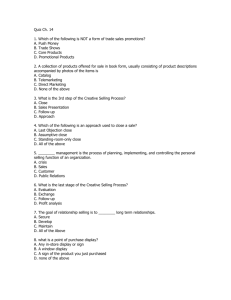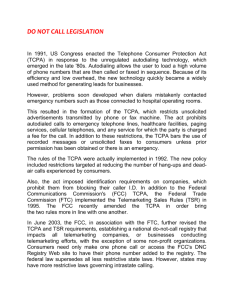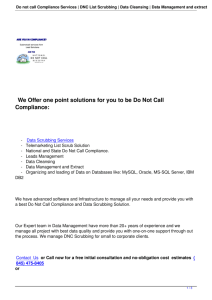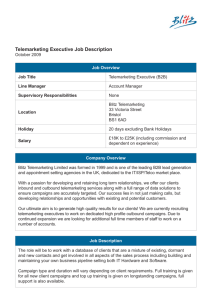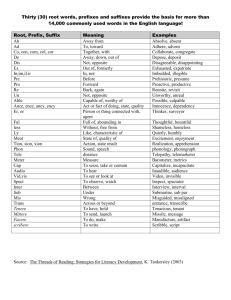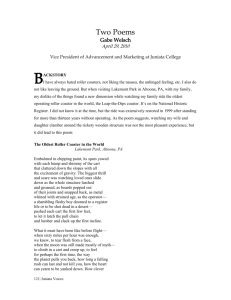MCMILLAN BINCH LLP
advertisement
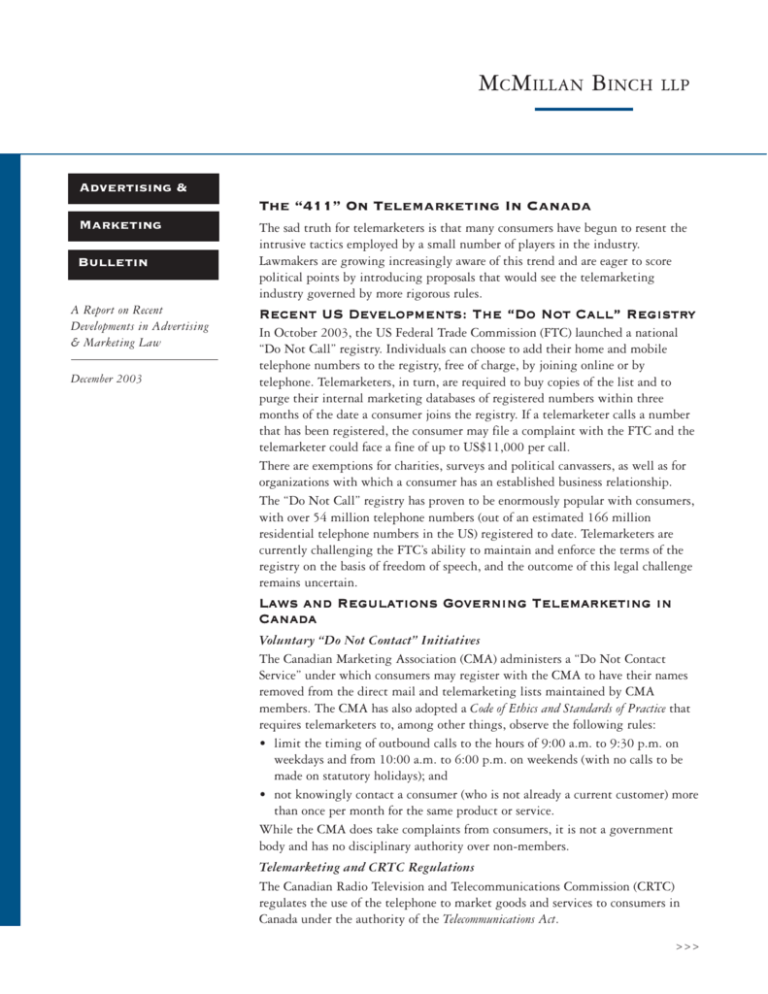
MCMILLAN BINCH LLP Advertising & The “411” On Telemarketing In Canada Marketing Bulletin A Report on Recent Developments in Advertising & Marketing Law December 2003 The sad truth for telemarketers is that many consumers have begun to resent the intrusive tactics employed by a small number of players in the industry. Lawmakers are growing increasingly aware of this trend and are eager to score political points by introducing proposals that would see the telemarketing industry governed by more rigorous rules. Recent US Developments: The “Do Not Call” Registr y Registry In October 2003, the US Federal Trade Commission (FTC) launched a national “Do Not Call” registry. Individuals can choose to add their home and mobile telephone numbers to the registry, free of charge, by joining online or by telephone. Telemarketers, in turn, are required to buy copies of the list and to purge their internal marketing databases of registered numbers within three months of the date a consumer joins the registry. If a telemarketer calls a number that has been registered, the consumer may file a complaint with the FTC and the telemarketer could face a fine of up to US$11,000 per call. There are exemptions for charities, surveys and political canvassers, as well as for organizations with which a consumer has an established business relationship. The “Do Not Call” registry has proven to be enormously popular with consumers, with over 54 million telephone numbers (out of an estimated 166 million residential telephone numbers in the US) registered to date. Telemarketers are currently challenging the FTC’s ability to maintain and enforce the terms of the registry on the basis of freedom of speech, and the outcome of this legal challenge remains uncertain. Laws and Regulations Governing Telemarketing in Canada Voluntary “Do Not Contact” Initiatives The Canadian Marketing Association (CMA) administers a “Do Not Contact Service” under which consumers may register with the CMA to have their names removed from the direct mail and telemarketing lists maintained by CMA members. The CMA has also adopted a Code of Ethics and Standards of Practice that requires telemarketers to, among other things, observe the following rules: • limit the timing of outbound calls to the hours of 9:00 a.m. to 9:30 p.m. on weekdays and from 10:00 a.m. to 6:00 p.m. on weekends (with no calls to be made on statutory holidays); and • not knowingly contact a consumer (who is not already a current customer) more than once per month for the same product or service. While the CMA does take complaints from consumers, it is not a government body and has no disciplinary authority over non-members. Telemarketing and CRTC Regulations The Canadian Radio Television and Telecommunications Commission (CRTC) regulates the use of the telephone to market goods and services to consumers in Canada under the authority of the Telecommunications Act. >>> MCMILLAN BINCH According to CRTC Order 2001-193 and the General Tariff, Item 1800, a telemarketer must remove a consumer’s name and telephone number from its internal marketing list within 30 days of receiving a request from the consumer to do so. This request must remain on file for at least three years. If a telemarketer calls a consumer who has previously indicated to that organization that he or she does not wish to receive further calls, the telemarketer’s phone service may be suspended or terminated. The CRTC has also set out a number of other telemarketing restrictions, including the following: • telemarketers must identify the person or organization on behalf of whom the call is being made; • the originating calling number (or an alternate number) must be displayed unless technical reasons prevent the telemarketer from doing so; • random dialling and calls to non-published numbers are allowed, but sequential dialling is not permitted; and • telemarketers may not make calls to emergency lines or to health care facilities. There are no calling hour restrictions on live voice telemarketing, but special rules apply to telefaxing and to the use of automatic dialling and announcing devices (ADADs) that deliver pre-recorded or synthesized voice messages. Telemarketing and the Competition Act Amendments made to the Competition Act (the Act) in 1999 specifically address certain telemarketing practices. Telemarketing representations that are false or misleading in a material respect are prohibited and those persons who engage in this type of conduct are liable to prosecution by the Competition Bureau. The Act requires that the telemarketer disclose the following information to the consumer in a fair and LLP reasonable manner at the beginning of each telephone communication: • the identity of the person on behalf of whom the communication is being made; • the nature of the product or business interest being promoted; and • the purposes of the communication. In addition, unless the information has been previously provided to the consumer within a reasonable amount of time before the call, or if the information is otherwise requested by the consumer during the call, the telemarketer must disclose the following information in a fair, reasonable and timely manner at some point during the telephone communication: • the price of the product being promoted; and • any material restrictions, terms or conditions applicable to the delivery of the product. Drawing Conclusions: How to A void Avoid a “Wrong Number” in a Telemarketing Campaign Whether outsourced or conducted in-house, a telemarketing campaign should be carefully managed from the start to ensure compliance with all legal requirements. The use of telemarketing scripts identifying the organization on behalf of whom the call is made and the purpose of the call is essential. Telemarketers should also provide proper training for call centre employees, emphasizing the need to avoid making false, misleading or deceptive representations about the product or service being offered. As of January 1, 2004, all telemarketers will also have to consider whether their marketing lists have been created in accordance with applicable privacy laws. Telemarketers should monitor conversations to ensure consistency in the application of the policies and procedures adopted for the campaign. Most importantly, consumer requests not to be contacted by the telemarketer in the future should be honoured and properly recorded. Written by: Bill Hearn The foregoing provides only an overview. Readers are cautioned against making any decisions based on this material alone. Rather, a qualified lawyer should be consulted. For further information, please contact your McMillan Binch LLP lawyer or one of the Practice Leaders of our Advertising & Marketing Group listed below: Sharon E. Groom Bill Hearn 416.865.7152 416.865.7240 sharon.groom@mcmillanbinch.com bill.hearn@mcmillanbinch.com © Copyright 2003 McMillan Binch LLP BCE Place • Suite 4400 • Bay Wellington Tower • 181 Bay Street • Toronto • Ontario • Canada • M5J 2T3 • www.mcmillanbinch.com • Fax: 416.865.7048 • Tel: 416.865.7000
